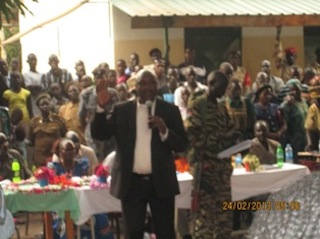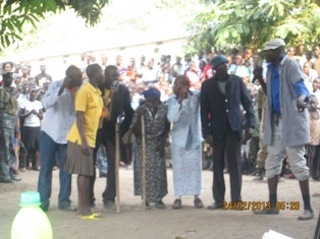Constitutional land rights in South Sudan “misinterpreted”, E. Equatoria governor
February 24, 2013 (JUBA) – The Governor of South Sudan’s Eastern Equatoria State, Luis Lobong Lojore, said on Sunday that the liberty of civilians to “choose residence” anywhere in the country has been taken out of context by some groups.

“The problem is the misinterpretation of the [South Sudan transitional] constitution,” Lojore said. Article 27 (1) says: “Every citizen shall have the right to freedom of movement and the liberty to choose his or her residence except for reasons of public health and safety as shall be regulated by law.”
Governor Lojore was responding to a petition presented by the Madi community, a tribe that traditionally inhibits Nimule, a South Sudan town bordering Uganda, 190 km southeast of the capital Juba.
A youth leader read a letter from the Madi community to the Governor outlining their concerns, which included; land grabbing; destruction of crops by cattle belonging to the people from neighbouring Jonglei state; parallel traditional courts for indigenous and other South Sudanese; harassment of local people by groups of Internal Displaced Persons (IDPs); and encroachment into South Sudanese territory by the Ugandan government.
Preferring to respond to the petition rather than making his prepared speech, Governor Lojore said land grabbing is unacceptable under international law. The governor also ordered cattle owners from Jonglei state to restrain their animals.
“I am a cattle keeper but I know cattle and crops do not mix,” said Lojore, receiving thunderous ululations from his audiences.
DEMOLITION OF SHOPS AND RESTAURANTS
Last week, South Sudan’s ministry of interior gave a 21-day ultimatum to owners of shops and restaurants constructed within the area demarcated for new migration and customs offices to be built.
Survey officials marked with red ink the business buildings that will be destroyed.
Owners allege that the process is not genuine and is related to competition over the lucrative trade center between the Madi, who own the town, and other South Sudanese.

Article 171 (2) categorises the land into public, community and private land. And article 171 (5) defines community as “all lands traditionally and historically held or used by local communities or their members. They shall be defined, held, managed and protected by law.”
South Sudanese from other states moved to Nimule, in Eastern Equatoria
state during the 1983—2005 Sudanese civil war and have never returned to their ancestral land. Wounded soldiers and their families; not natives of Nimule, have also stayed on in Nimule.
Issues of land rights are sensitive in South Sudan, with tribal feuds often blamed of on land ownership. Politicians often use land wrangles to consolidate political dominance.
(ST)

